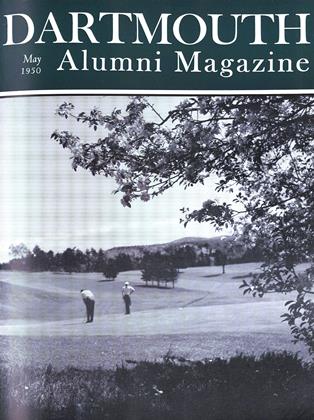by JudsonStanley Lyon '40. Yale University Press,19500.154 pp. $ 3.75.
Professor Lyon's well-written study of Wordsworth, The Excursion, fills a long existing gap in the history of Wordsworth's thought, and, indeed, in the history of English poetry. It is a remarkable fact that this major poem by one of the handful of major English poets has had little or no attention paid to it since shortly after Wordsworth's death.
One reason for the neglect has been the ebb of taste which has left long poems, particularly long didactic poems, high and dry on the shoals of college classes, and Wordsworth's poem has seldom received even this doubtful form of immortality. Even the "new critics," who are attempting to establish superior techniques for the close and careful reading of poetry, devote almost all their energies to poems of a length not exceeding a page or two.
Another reason is the suspicion that even among long didactic poems The Excursion ranks low. Many more people have read the unfavorable things said about it than have read the poem itself. When it appeared Jeffrey exclaimed, "This will never do," and John Wilson wrote, "I confess that the 'Excursion' is the worst poem, of any character, in the English language."
Yet Wordsworth himself was convinced that he had written a poem that, in the words of Milton, posterity would "not willingly let die," and Keats hailed it as one of the "three things to rejoice at in this age." And, surely, even granting that Wordsworth and Keats could be wrong, the place of Wordsworth in the history of English poetry is such that no poem of his which throws light on his thought and the development of his poetry can be neglected.
The neglect of The Excursion will henceforth have less to excuse it. This intelligent and scholarly book provides a general introduction that will make the path of the future student easier. It studies the reputation of the poem, its history, its sources and anaogues, its content, and its style. As a result of this study Professor Lyon concludes: "We have attempted to show that The Excursion cannot be dismissed as the dull and pompous preaching of an aged poet in his decline. We have seen that The Excursion should be almost exempt from the common accusation of excessive orthodoxy and Toryism. We have a so seen that Wordsworth himself was intellectually and emotionally involved in almost every line of it, much as he was in ThePrelude. The Excursion represents the inner psychological and philosophical struggles of Wordsworth himself, as well as of a great mass of his contemporaries. It bears clear evidence of several important strides forward in the poet's mental development. It came from the pen of a more profound, more serene, and wiser Wordsworth than did most of the previous works."
Professor Lyon has admirably succeeded in the task he set himself. If future students pay more attention to The Excursion than have their colleagues in the past, they will be able to build on the foundations laid here.
 View Full Issue
View Full Issue
More From This Issue
-
 Article
ArticleWDBS
May 1950 By DICK T. HOLLANDS '50 -
 Class Notes
Class Notes1917
May 1950 By KARL W. KOENICER, DONALD BROOKS, HOWARD A. STOCKWELL -
 Class Notes
Class Notes1918
May 1950 By ERNEST H. EARLEY, DONALD L. BARR, RICHARD A. HOLTON -
 Class Notes
Class Notes1923
May 1950 By TRUMAN T. METZEL, COLIN C. STEWART 3RD, LEON H. YOUNG JR. -
 Class Notes
Class Notes1905
May 1950 By ROYAL PARKINSON, GILBERT H. FALL, FLETCHER A. HATCH -
 Class Notes
Class Notes1929
May 1950 By F. WILLIAM ANDRES, EDWIN C. CHINLUND, GEORGE B. REDDING
Vernon Hall Jr.
-
 Books
BooksOF A HUNTER, NOW!
May 1945 By Vernon Hall Jr. -
 Books
BooksTHE OTHER KINGDOM,
February 1948 By Vernon Hall JR. -
 Books
BooksTHE NOBEL PRIZE TREASURY
July 1948 By Vernon Hall Jr. -
 Books
BooksTHE LANGUAGE OF NATURAL DESCRIPTION IN EIGHTEENTH-CENTURY POETRY,
June 1949 By Vernon Hall Jr. -
 Books
BooksQUEST FOR MYTH
December 1949 By Vernon Hall Jr. -
 Books
BooksROMANCE IN THE MAKING: CHRETIEN DE TROYES AND THE EARLIEST FRENCH ROMANCES.
January 1955 By VERNON HALL JR.
Books
-
 Books
Books"Anetka's Carol," the fifth of a series of six
JANUARY, 1928 -
 Books
BooksTHE SOVIET DESIGN FOR A WORLD STATE.
July 1960 By CHARLES B. MCLANE '41 -
 Books
BooksHUMANISM AND POLITICS. STUDIES IN THE RELATIONSHIP OF POWER AND VALUE IN THE WESTERN TRADITION.
JUNE 1969 By MAURICE MANDELBAUM '29 -
 Books
BooksCelebration
January 1977 By R.H.R -
 Books
BooksForm and Message
JUNE 1977 By RUDI BLESH '21 -
 Books
BooksDO YOU PLAY STAYMAN?
JANUARY 1966 By THOMAS E. KURTZ


